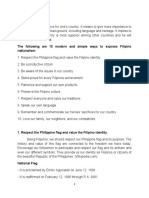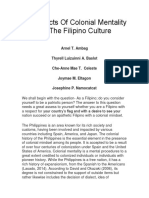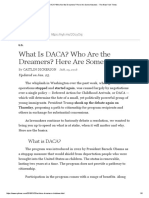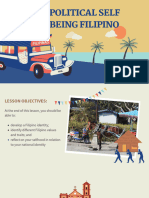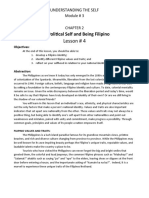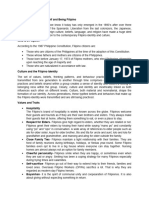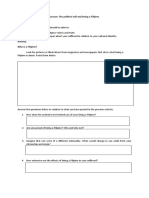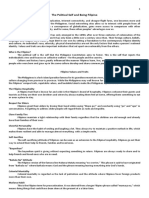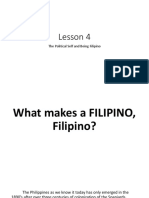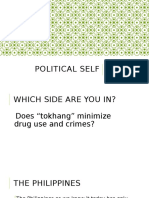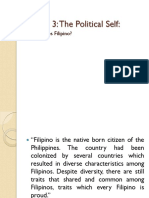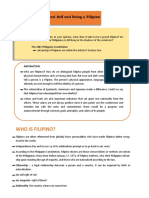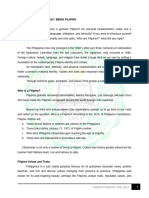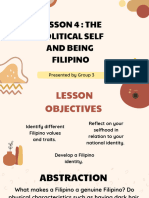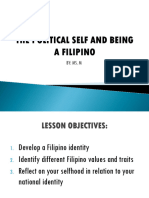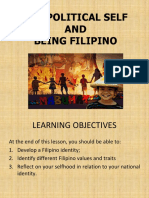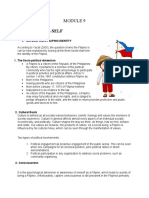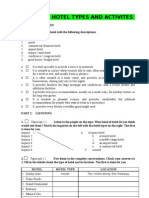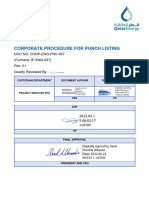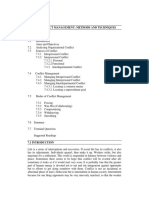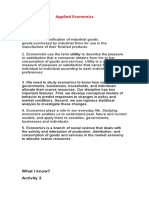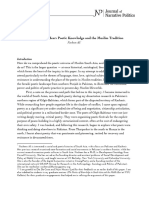Module 5
Module 5
Uploaded by
Kentjohn QuiraoCopyright:
Available Formats
Module 5
Module 5
Uploaded by
Kentjohn QuiraoOriginal Title
Copyright
Available Formats
Share this document
Did you find this document useful?
Is this content inappropriate?
Copyright:
Available Formats
Module 5
Module 5
Uploaded by
Kentjohn QuiraoCopyright:
Available Formats
Lesson 2: Unpacking the Self: The Political Self of Being Filipino
Lesson Objectives:
At the end of the lesson, you should:
1. Develop a Filipino Identity.
2. Identify different Filipino values and traits.
3. Reflect on selfhood in relation to your national identity.
Who is Filipino?
Filipinos are often referenced to globally renowned personalities like Manny Pacquiao, Lea
Salonga, and Michael Cinco who have made Filipinos recognized around the world through their
expertise. However, being a Filipino is far more than just being related to these notable figures.
Independence Day and Buwan ng Wika celebrations prompt us to go back to our roots and reflect
the question: Who is a Filipino?
Technically, according to the 1987 Philippine Constitution,
Filipino citizens are "...those whose fathers or mothers are citizens
of the Philippines, those born before January 17, 1973, of Filipino
mothers, who elect Philippine citizenship upon the age of majority,
and those who are naturalized in accordance with law." However,
citizenship is not the only marker of being a Filipino. Culture and
history have greatly influenced the manner Filipinos learn, live,
and behave to date. People who were born and grew up in the
same culture develop and share common personality traits and
values. Generations after generations, common traits and values
have been passed on that the Filipinos of today still embody. https://depositphotos.com/vector-images/filipino-
culture.html
Filipino Values and Traits
The Philippines is a lush island paradise famous for its grandiose mountain views,
pristine beaches, and rich and diverse culture changing from province to province. While the
Philippines may be well known for its awe-inspiring beauty, perhaps the Filipinos' unique traits,
reputable values, and laudable talents make the country a place to be. Tourists who have visited
the Philippines can never forget the big and bright smiles that greeted them, the colorful and
loud jeepneys, the common Filipino phrases such as "Mabuhay!" and "Salamat!" and habits
such as saying "po" and “opo” to the elders, leaving shoes or slippers at the front door before
entering a house, and the importunate asking of "Kumain ka na ba?" meaning "Have you eaten
yet? Indeed, it is a marvel to experience these unique traits of the Filipinos firsthand. Few of
these traits are as follows.
Bayanihan
Bayanihan is the spirit of communal unity cooperation of Filipinos. It is also about giving
without expecting something in return. Filipinos are always ready to share and help their friends
and loved ones who are in need. It may not always be in monetary form, but the time and effort
they give also count as a form of help for them. This trait is particularly manifested in how
Filipinos rally themselves to send aid to those who are severely affected by natural calamities.
"Bahala Na" Attitude
"Bahala na" is the Filipino version of the famous line "Hakuna Matata, meaning no worries.
The phrase is said to have originated from "Bathala na," where Bathala means God, and the
phrase meaning leaving everything into God's hands. It can also be viewed as something similar
to the cheerful and positive attitude of Filipinos and allowing situations take care of themselves
instead of worrying about them.
Colonial Mentality
Colonial mentality is regarded as the lack of patriotism and the attitude where Filipinos
favor foreign products more than their own. This does not only concern goods, but also the desire
to look more foreign than local and keep up with foreign beauty trends. It is attributed to the
centuries of colonization Filipinos had experienced under the Spanish, American, and Japanese
rule.
"Mañana" Habit
This is the Filipino term for procrastination. It was derived from a longer Filipino phrase
called "Mamaya na" meaning dawdling things, which could have been done at an earlier time. It
is a poor habit of laziness that results in heavier workloads.
"Ningas Kugon"
"Ningas" is a Filipino term for flame and "kugon" is a Filipino term for Cogon grass that
easily burns out after it is put into flames. Ningas kugon refers to the attitude of eagerly starting
things but quickly losing eagerness soon after experiencing difficult just like how fast fire of a
Cogon grass burns out moments after being ignited. Laziness is a common problem among
Filipinos; that is why Filipinos are regarded as "Juan Tamad" or Lazy Juan.
Pride
Most Filipinos hold on to their pride as if they are more precious than keeping a good
relationship with family and loved ones. When two parties are not in good terms, they find it so
hard to apologize and wait until the other party asks for an apology first.
Crab Mentality
This is a toxic trait among Filipinos where one resents the achievement of another, instead
of feeling happy for that person. Just like crabs in a container, they pull each other down and ruin
each other's reputation rather than bringing them up, resulting to no progress. Filipinos should
change this troublesome attitude and focus more on their own inadequacies to improve one's
A famous Filipino legend is about the origin of the pineapple fruit. It is about a story of
a young and lazy girl named Pina who always asked where her mother kept the things she
needed without looking for them first. When Pina's mother got tired of being asked where she
hid her things, her mother wished that eyes be planted on Pina's face so she would start
using them. To her mother's surprise the next morning, Pina was gone and a fruit sprung in
the yard. implanted with "eyes" all around its body which was later called "pinya, "the Filipino
term for "pineapple."
4. Heroes and Icons
Heroes serve as a reminder of true patriotism and nationalism as they have sacrificed
their lives for the sake of their country's freedom and progress. Every year, we whole day to
celebrate our heroes, usually the last Monday of August, to remember their greatness,
bravery, and resilience that has led to the freedom we know today.
Famous Filipino icons such as Lea Salonga, Manny Pacquiao, and our very own
national hero, Jose Rizal, also serve as important Filipino markers as they have made the
Filipino name more pronounced worldwide through their own expertise.
How To Be a Good Filipino
Now you know that your traits and values are important indicators of being a Filipino.
The problem now is how to truly become one and how you can be useful to the development
and progress of our country. The following are a few ways on how to be a good Filipino:
1. Be an active Filipino citizen.
A good Filipino citizen is aware of the current events and participates in
government programs that aim for the country's progression and development. By
simply exercising your right to vote, you also become an active citizen. When it comes
to voting, the rich and the poor have equal voting rights every Filipino citizen of legal
age have a chance in choosing the right leaders for the Philippines who are genuine in
helping and caring for the Filipino people.
2. Study the Philippine history.
The road of the Philippine history is long and bloody, and by learning and fully
understanding the events of the Philippine history, you will learn so much as to why it
is so important for you to love your country with your life, extend help to your fellow
Filipinos in need, and recognize abuse of political power.
3. Support local products.
When you buy local products, you do not only support local manufacturers and
businessmen, but you also help strengthen the local economy. is this so? There will be
more demand of local products, thus, local businesses will be in need for more
employees, which will open new job opportunities. The business owners will also
invest within the country and are less likely to leave. Supporting our local products
also displays our creativity, innovativeness, and resourcefulness.
4. Speak the Filipino language.
The history of the Filipino language was as long and hard as the Philippine
history. Jose Rizal highlighted the importance of speaking a national language as a
way of displaying the love for one's country. Speaking Filipino also serves as a unique
identifier of being a Filipino. It has been a decade-long debate whether to use Filipino
as the instructional language in school and to translate textbooks into Filipino,
however, this is still not strictly imposed.
5. Do not spread fake news and be democratic in engaging with dissent.
This period in the history of the Philippines has seen how the Internet has
spawned tons of possibilities for people, both good and bad. For instance, it is easier
for Filipinos working abroad to communicate with their loved ones left in the
Philippines through the Internet: Despite this, the Internet has also made the spread of
fake news very common. Likewise, the Internet has also made us engage in intense
arguments with people across the globe about our political positions, for example. It is
a part of being a good Filipino to understand and verify what you read online,
especially in social media, before actually believing in it and spreading it like wildfire. It
is also the responsibility of every Filipino to recognize disagreement in political views,
be tolerant, and argue intelligently without having to resort into name-calling people.
Reference:
Alata, E. J. P. et.al (2018). Understanding the Self. REX Book Store, Inc. Manila,
Philippines.
Additional Readings:
1. Filipino Culture https://culturalatlas.sbs.com.au/filipino-culture/filipino-culture-core-
concepts
2. Things to Know and Love about Filipino Culture and Values
https://everythingzany.com/filipino-culture-and-values/
You might also like
- Ignite MeDocument13 pagesIgnite Mehotovapetra69No ratings yet
- Wonderlic TestDocument3 pagesWonderlic TestRáńéśh Nesh50% (2)
- CFLM 1 - Nationalism and Patriotism With Environmental LawsDocument32 pagesCFLM 1 - Nationalism and Patriotism With Environmental LawsMichael Egot100% (1)
- The Effects of Colonial Mentality On The Filipino CultureDocument8 pagesThe Effects of Colonial Mentality On The Filipino CultureShean Berwin Gonzales100% (1)
- What Is DACA, Who Are The Dreamers?Document5 pagesWhat Is DACA, Who Are The Dreamers?IvánNo ratings yet
- The Political Self Being A FilipinoDocument33 pagesThe Political Self Being A Filipinogh52j6nrt5No ratings yet
- Lesson 8 The Political Self and Being FilipinoDocument28 pagesLesson 8 The Political Self and Being Filipinovicky manimtimNo ratings yet
- Module 8 Political Self and Being A FilipinoDocument9 pagesModule 8 Political Self and Being A FilipinoJhane XiNo ratings yet
- GE Module 3Document11 pagesGE Module 3bhealaas0811No ratings yet
- Lesson # 4: The Political Self and Being FilipinoDocument11 pagesLesson # 4: The Political Self and Being FilipinoMary Quezia AlferezNo ratings yet
- MODULE 8 - The Political Self and Being FilipinoDocument12 pagesMODULE 8 - The Political Self and Being FilipinoNovie Viernes75% (4)
- The Political Self and Being FilipinoDocument30 pagesThe Political Self and Being Filipinoglazeguinoo100% (1)
- Understanding The Self Chapter 2 Lesson 4Document26 pagesUnderstanding The Self Chapter 2 Lesson 4Jave CabilladaNo ratings yet
- Lesson 8 The Political Self and Being A FilipinoDocument3 pagesLesson 8 The Political Self and Being A FilipinoLerramie Dela PeñaNo ratings yet
- Group 5 Filipino TraitsDocument3 pagesGroup 5 Filipino Traitspandacrenalyn07No ratings yet
- Lesson 4 The Political Self and Being FilipinoDocument3 pagesLesson 4 The Political Self and Being FilipinocondrillondenmarjohnNo ratings yet
- Lesson: The Political Self and Being A Filipino Lesson ObjectivesDocument3 pagesLesson: The Political Self and Being A Filipino Lesson ObjectivesJP AtrashiNo ratings yet
- Lesson 4: The Political Self and Being FilipinoDocument26 pagesLesson 4: The Political Self and Being FilipinoJonnel Lumangyao JrNo ratings yet
- The Political Self and Being A FilipinoDocument6 pagesThe Political Self and Being A Filipinosheralynbastillador1No ratings yet
- The Political Self and Being FilipinoDocument2 pagesThe Political Self and Being FilipinoLuie john MalimitNo ratings yet
- The Political Self and Being FilipinoDocument2 pagesThe Political Self and Being FilipinoJP Mosquera100% (2)
- Lesson 4: The Political Self and Being FilipinoDocument11 pagesLesson 4: The Political Self and Being FilipinoHalid C. MatuanNo ratings yet
- Political SelfDocument20 pagesPolitical SelfYou're WelcomeNo ratings yet
- Political SelfDocument3 pagesPolitical SelfROEN SHANE RAMONALNo ratings yet
- Module 5 - Undersanding The SelfDocument47 pagesModule 5 - Undersanding The SelfDeniel DenamarcaNo ratings yet
- Filipino Values and Traits G8Document3 pagesFilipino Values and Traits G8Charles AngeL DayonoNo ratings yet
- Political SelfDocument3 pagesPolitical SelfAaron VillaflorNo ratings yet
- Lesson3-Self As FilipinoDocument23 pagesLesson3-Self As FilipinoNino Joycelee TuboNo ratings yet
- The Political Self and Being A FilipinoDocument13 pagesThe Political Self and Being A FilipinohilichurlNo ratings yet
- Lesson 5 The Political SelfDocument5 pagesLesson 5 The Political SelfMary Grace ApduaNo ratings yet
- GE 1 Chap. 4 Political SelfDocument9 pagesGE 1 Chap. 4 Political Selfcristymarrie mellaNo ratings yet
- Chapter 2 RPH Who Is The FilipinoDocument8 pagesChapter 2 RPH Who Is The FilipinoMary Claire LumbaoNo ratings yet
- UNDERSTANDING THE SELF CHAPTER 2 Lesson 4Document5 pagesUNDERSTANDING THE SELF CHAPTER 2 Lesson 4teofila.tiongcoNo ratings yet
- UTS GROUP 9- POLITICAL SELF NARRATIVE REPORTDocument8 pagesUTS GROUP 9- POLITICAL SELF NARRATIVE REPORTprincess.gapol96No ratings yet
- Chapter II Lesson 4 Understanding The SelfDocument8 pagesChapter II Lesson 4 Understanding The SelfJae Anne Punongbayan88% (8)
- The Political Self and Being A FilipinoDocument15 pagesThe Political Self and Being A FilipinojohnmichaelfloritoNo ratings yet
- Understanding The Self - FinalsDocument62 pagesUnderstanding The Self - FinalsBetty Munoz67% (3)
- The Political Self and Being FilipinoDocument33 pagesThe Political Self and Being Filipinopaul_fuentes_4No ratings yet
- The Political Self and Being Filipino by Group 3 - 20231205 - 101158 - 0000Document38 pagesThe Political Self and Being Filipino by Group 3 - 20231205 - 101158 - 0000Mai VillaruzNo ratings yet
- Module 9 - The Political SelfDocument5 pagesModule 9 - The Political Selfjovan candelaNo ratings yet
- Notes-on-Political-SelfDocument3 pagesNotes-on-Political-SelfJericho Miles GenteroneNo ratings yet
- Semi Final LectureDocument3 pagesSemi Final LectureVanessa CuevasNo ratings yet
- Lesson 4Document38 pagesLesson 4penadolisaNo ratings yet
- The Political Self and Being A FilipinoDocument10 pagesThe Political Self and Being A FilipinorondaletomarongronNo ratings yet
- Chapter 2 Lesson 4Document28 pagesChapter 2 Lesson 4Syrel SantosNo ratings yet
- Filipino TraitsDocument18 pagesFilipino TraitsKyle BuebosNo ratings yet
- Module 8 Political SelfDocument17 pagesModule 8 Political SelfLei MañaleNo ratings yet
- Chapter 8 - Political Self and Being FilipinoDocument28 pagesChapter 8 - Political Self and Being FilipinoDianne Dawn100% (1)
- 2 The Political and Being A FilipinoDocument21 pages2 The Political and Being A FilipinoAtalanta LeeNo ratings yet
- 6 UTS Political DigitalDocument32 pages6 UTS Political DigitalKc Alcantara NacarioNo ratings yet
- Political Self and Being SelfDocument47 pagesPolitical Self and Being SelfhazelmaedalitNo ratings yet
- Filipinos Then, Filipinos Now Essay - CookMyProjectDocument5 pagesFilipinos Then, Filipinos Now Essay - CookMyProjectgemrod floranoNo ratings yet
- UTS - MODULE 10 - My Political SelfDocument6 pagesUTS - MODULE 10 - My Political SelfSheds Abad LayonaNo ratings yet
- Chapter 7 - The Political SelfDocument3 pagesChapter 7 - The Political SelfAngel Vasquez AlbertNo ratings yet
- The Political Self and Being FilipinoDocument17 pagesThe Political Self and Being FilipinoMalen GallegosNo ratings yet
- The Political Self and Being A FilipinoDocument48 pagesThe Political Self and Being A Filipinoklei100% (1)
- The Political Self and Being FilipinoDocument30 pagesThe Political Self and Being FilipinoNerish PlazaNo ratings yet
- Baquiran, Ruby-Lyn Benitez, Jericho Bscpe 1-1Document34 pagesBaquiran, Ruby-Lyn Benitez, Jericho Bscpe 1-1Gadjeel RedfoxNo ratings yet
- The Political SelfDocument17 pagesThe Political SelfRegino PasicolanNo ratings yet
- Political SelfDocument26 pagesPolitical SelffrincenicolequinalNo ratings yet
- Filipino ValuesDocument6 pagesFilipino ValuesMig FlorendoNo ratings yet
- Ge 101 Module 5Document8 pagesGe 101 Module 5Charity Anne PedrosoNo ratings yet
- Unit 1 Hotel Types and ActivitiesDocument8 pagesUnit 1 Hotel Types and Activitieskieu77100% (1)
- Resume of Janegon90Document2 pagesResume of Janegon90api-23639793No ratings yet
- Grade 5 Sped Hi: Asses Sment FOR Week 1Document7 pagesGrade 5 Sped Hi: Asses Sment FOR Week 1Erwin N CasinoNo ratings yet
- 2C05 2018-5-012 Devinta T1 BI2 PDFDocument9 pages2C05 2018-5-012 Devinta T1 BI2 PDFDevinta Putri ArdaniNo ratings yet
- Aveyond StorylineDocument59 pagesAveyond StorylineTim AlvaranNo ratings yet
- Final Term Paper ExampleDocument5 pagesFinal Term Paper Exampleafdtunqho100% (1)
- CORP ENG PRC 007Rv1Document15 pagesCORP ENG PRC 007Rv1Mohammad SalehNo ratings yet
- Resident Status Tutorial 2 AnswerDocument3 pagesResident Status Tutorial 2 AnswernurnazreenawiNo ratings yet
- Structure: Unit 7 Conflict Management: Methods and TechniquesDocument16 pagesStructure: Unit 7 Conflict Management: Methods and TechniquesParag ShrivastavaNo ratings yet
- Sindhi: Made by Muhammad Bin Rehan and Zarrar Hamza KhanDocument10 pagesSindhi: Made by Muhammad Bin Rehan and Zarrar Hamza KhanZarrar Hamza KhanNo ratings yet
- Julian H. Revolie Sexually Violent Predator NotificationDocument1 pageJulian H. Revolie Sexually Violent Predator NotificationMichael_Lee_RobertsNo ratings yet
- HAVERTON VS NLRCDocument3 pagesHAVERTON VS NLRCShiena Lou B. Amodia-RabacalNo ratings yet
- Mizuno Corporation - WikipediaDocument11 pagesMizuno Corporation - WikipediaNUTHI SIVA SANTHANNo ratings yet
- Northumbria University NewcastleDocument17 pagesNorthumbria University NewcastleNox LuxNo ratings yet
- Non Conformance Report Log /status As On 13-Jun-18Document13 pagesNon Conformance Report Log /status As On 13-Jun-18Mohamed ThowfeekNo ratings yet
- Applied Economics WEEK 1Document6 pagesApplied Economics WEEK 1Angelica BerbalNo ratings yet
- Departmental AccountingDocument10 pagesDepartmental AccountingRobert HensonNo ratings yet
- Tawiah Afutu RespondentDocument36 pagesTawiah Afutu RespondentNana Asante AkyeampongNo ratings yet
- Emotional IntelligenceDocument20 pagesEmotional IntelligencesumantNo ratings yet
- Nicholas Decarlo Complaint 2021Document6 pagesNicholas Decarlo Complaint 2021Honolulu Star-AdvertiserNo ratings yet
- Winged Altarpieces in Medieval HungaryDocument17 pagesWinged Altarpieces in Medieval Hungarylucian9540No ratings yet
- Tantra Marg - Posts Shodashi TripuraDocument284 pagesTantra Marg - Posts Shodashi Tripuraajay khannaNo ratings yet
- Starkville Dispatch Eedition 9-19-19Document12 pagesStarkville Dispatch Eedition 9-19-19The DispatchNo ratings yet
- HPS GroundnutsDocument13 pagesHPS Groundnutsnaresh332No ratings yet
- Cola QuesDocument4 pagesCola QuesGaurav AroraNo ratings yet
- Chairs Joints, Wood Joints, Wood, Antique Furniture, DesignDocument78 pagesChairs Joints, Wood Joints, Wood, Antique Furniture, DesignNicoleta Marian100% (2)
- From Hallaj To Heer Poetic Knowledge andDocument25 pagesFrom Hallaj To Heer Poetic Knowledge and2016n4091No ratings yet


